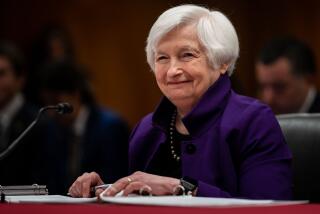Greenspan, Summers Oppose Proposal to Double FDIC Cap
- Share via
WASHINGTON — The banking industry’s proposal to double the limit on federal deposit insurance to $200,000 per account ran into stiff opposition Wednesday from two key officials.
Federal Reserve Chairman Alan Greenspan and Treasury Secretary Lawrence Summers both advised Congress against the idea, which Greenspan said amounted to giving “increased subsidies to upper-income individuals.”
Greenspan and Summers were asked their views on the proposal during testimony in support of unrelated legislation to modernize regulation of the nation’s futures markets. The question came from Senate Banking Committee Chairman Phil Gramm (R-Texas).
Backers of the deposit insurance proposal, including major groups representing banks, say it is needed to take account of inflation since the limit was raised to $100,000 per account in 1980.
But Greenspan said such an increase would be “a major policy mistake.”
Summers, likewise, said the idea is “ill advised, and would represent a serious public policy error.”
Donna Tanoue, head of the Federal Deposit Insurance Corp., said later that the agency was weighing the proposal but had not endorsed it. “We respect the opinions of the Fed chairman and the secretary of the Treasury and will take them into account in our review,” she said.
Legislation has been introduced in both the House and the Senate to raise the cap to $200,000 and index it to inflation. Greenspan and Summers both expressed concern that raising the insurance limit might lead to riskier behavior by banks.
The 1980 increase in the limit from $40,000 to $100,000 is often cited as contributing to the severity of the subsequent savings and loan crisis, as many S&Ls; attracted deposits by paying exorbitant yields, then investing the money in real estate projects that later bombed.
Depositors had no need to worry whether an S&L; was investing prudently because they knew their money was protected by the government.
Nonetheless, an increase in deposit insurance coverage is particularly sought today by small community banks that hope it will help them stem the loss of deposits to other investments such as mutual funds.
“Deposit insurance is the foundation of consumer confidence in our financial system and inflation should not be allowed to erode FDIC protection,” said Ken Guenther, executive vice president of the Independent Community Bankers of America.
Greenspan said he sympathized with community banks’ struggles to maintain their deposit base, but said other means should be sought to assist them.
“Creating weakness in our underlying financial structure for the purpose of resolving a real problem, but a different kind of a problem, in my judgment would be a major policy mistake,” he said.
Meanwhile, Greenspan and Summers expressed support for legislation to overhaul futures market regulation. The bill was introduced this month by Sen. Richard Lugar ( R-Ind.), the Agriculture Committee chairman.
Both Greenspan and Summers said Lugar’s plan would provide investors with the necessary protection without stifling innovation in the fast-changing futures and derivatives markets.
The legislation would reauthorize the operations of the Commodity Futures Trading Commission, which regulates futures markets.
At the same time, Greenspan and Summers agreed that the $80-trillion market in over-the-counter derivative securities should continue to be exempt from regulation.
Major institutions and companies use OTC derivative securities to make bets on market movements or reduce risk in their portfolios or businesses.
*
Reuters and Associated Press were used in compiling this report.
More to Read
Sign up for Essential California
The most important California stories and recommendations in your inbox every morning.
You may occasionally receive promotional content from the Los Angeles Times.













